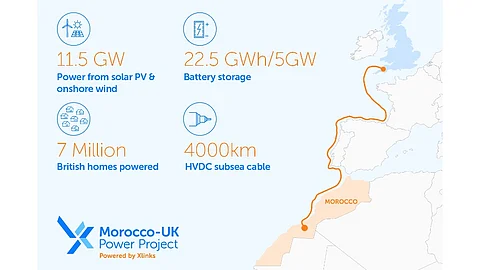

The UK has said it is not interested in being part of the Morocco-UK Power Project of Xlinks, considering it a risky proposition
Energy Minister Michael Shanks said the project is not aligned with its objective to build homegrown power
The project was designated as a Nationally Significant Project by the previous administration
The UK Government has expressed disinterest in the ambitious Morocco-UK Power Project, an initiative of British company Xlinks that plans to transmit solar and wind energy via subsea cables from North Africa to Britain, concluding that it is not in the national interest.
This Xlinks project targets to generate clean energy from 11.5 GW of large-scale solar and wind energy facilities in Morocco, along with a 22.5 GWh/5 GW battery installation in Morocco’s Tan-Tan province.
For the UK, Xlinks proposed to secure 3.6 GW of energy supply from the project for an average of 19+ hours/day to power over 7 million homes. This, the company believes, will cover 8% of Great Britain’s electricity needs.
Xlinks had been seeking a bilaterally negotiated 25-year Contract for Difference (CfD) with the UK government to guarantee a long-term price/MWh of electricity supply from the project.
However, the UK’s Minister for Energy Security and Net Zero, Michael Shanks, in a statement to the national Parliament, said, “This would be a first of a kind mega project which has a high level of inherent, cumulative risk (delivery, operational, and security).”
He added, “Ultimately, we have determined there are stronger alternative options that we should focus our attention on to meet the government’s plans to decarbonise the power sector and accelerate to net zero at least risk to billpayers and taxpayers. The government also believes that domestic alternatives can see greater economic benefits whether that be through jobs or supply chains.”
Shanks’ statement added that the project does not clearly align strategically with the government’s mission to build homegrown power in the UK. This is something the new Labour government has been working on with its CfD auctions, launching the Great British Energy, and very recently proposing solar panels for all new-build homes under the upcoming Future Homes Standard (see New UK Homes To Have Solar Panels ‘By Default’).
On its part, Xlinks said that it is ‘hugely surprised and bitterly disappointed’ with the UK government’s withdrawal from the project that it designated as a Nationally Significant Project in 2023.
“The Project requires no upfront Government investment and offered a highly competitive CfD strike price,” said Xlinks Chair Sir Dave Lewis. “It would reduce wholesale electricity prices by over 9% in its first year; bring in £20bn of socio-economic value, including a £5bn injection into the UK’s green industries; provide 8% of the UK’s electricity needs at a time when demand is rocketing; cut power sector CO2 emissions by c.10% in its first year; and increase energy security through increased diversity of supply and reduced reliance on imported gas.”
“Ultimately, we have no choice but to accept DESNZ’s decision. We are now working to unlock the potential of the Project and maximise its value for all parties in a different way,” added Lewis.
The company says that the project has already secured more than £100 million from leading energy sector players. France’s TotalEnergies, Abu Dhabi National Energy Company (TAQA), and Britain's Octopus Energy are some of the investors in the project (see Europe Solar PV News Snippets).
